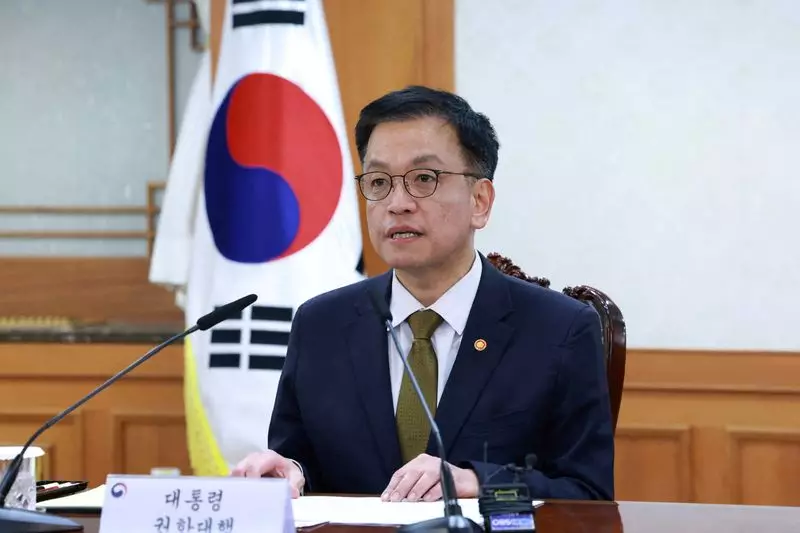As South Korea finds itself navigating through a complex political landscape, the recent statements by acting president Choi Sang-mok highlight the delicate balance that the nation must maintain in its foreign relations, particularly with the United States. The anticipation of a reciprocal relationship under President Trump’s recently inaugurated administration is not just optimistic rhetoric; it signifies deeper concerns regarding how U.S. policies may impact the economic fabric of South Korea. This proactive approach taken by Choi, who also serves as the finance minister, reflects an acute awareness of the potential ramifications of U.S. decisions on the already volatile economic situation.
South Korea stands as the fourth-largest economy in Asia, and its leaders must tread carefully in securing beneficial ties with the U.S., especially amidst ongoing political turmoil that has led to significant leadership changes at home. The slogan, “We Go Together,” which underscores the Korea-U.S. alliance, encapsulates their shared values but also highlights the precariousness of their diplomatic standing as South Korea grapples with its internal crises.
Choi’s appointment as acting president came at a critical moment following the impeachment of both Prime Minister Han Duck-soo and President Yoon Suk Yeol. This political instability not only poses challenges domestically but also handicaps South Korea’s diplomatic leverage internationally. For example, while countries like China and Japan are sending senior officials to foster relations with the U.S., South Korea’s internal disruptions prevent it from engaging at the same level, which might worsen its position on the global stage.
The absence of direct communication between Choi and Trump, especially after Trump has already conversed with Yoon, emphasizes the diplomatic disadvantages South Korea faces due to its turbulent political environment. It creates a perception of uncertainty surrounding South Korea’s political stability, a factor that foreign powers often consider in diplomatic negotiations.
In his latest remarks, Choi acknowledged the need for South Korea to closely assess Trump’s trade policies, particularly those related to tariffs and the electric vehicle (EV) sector. The U.S. is set to impose significant tariffs that could encumber South Korean firms operating in Canada and Mexico, thereby impacting trade dynamics significantly. South Korea historically has maintained a favorable trade surplus with the U.S., hitting a record-high trade surplus of $55.7 billion in 2024, which raises concerns about potential retaliatory measures from the U.S. administration.
Experts in the field are wary; they predict that defense cost-sharing negotiations for U.S. troops stationed in South Korea could also come under scrutiny. As Trump has previously indicated his desire for South Korea to contribute more financially, this might further strain bilateral relations at a time when mutual trust is paramount.
The immediate market responses to Trump’s announcements reflect the entwined nature of politics and economics in South Korea. The benchmark KOSPI index’s rapid reversal after initial gains underscores investor anxiety regarding U.S. policy directions. Industries that are sensitive to international tariffs, such as battery manufacturing and shipbuilding, have shown divergent responses, illustrating the intricate web of reliance and exposure to foreign policies that South Korean corporations navigate.
Companies like LG Energy Solution have already begun feeling the sting of policy changes, as the company’s stock plummets in response to potential shifts in EV subsidies under Trump’s administration. Conversely, the shipbuilding sector has seen increases, hinting at the possibility of cooperation opportunities with the U.S. moving forward.
The South Korean government must engage in strategic policymaking to navigate the evolving landscape of U.S.-South Korea relations effectively. Choi Sang-mok’s administration is tasked with not only enhancing cooperation based on shared values but also with allaying fears of adverse economic impacts driven by U.S. trade policies and tariffs.
As South Korea continues to adapt to shifting political currents both domestically and internationally, the outcome will significantly depend on how adeptly it can balance its commitments and leverage its longstanding alliance with the United States amidst tumultuous geopolitical tides. The road ahead may be fraught with challenges, but a careful and deliberate approach will be crucial for ensuring South Korea’s economic and diplomatic resilience in a rapidly changing world.

